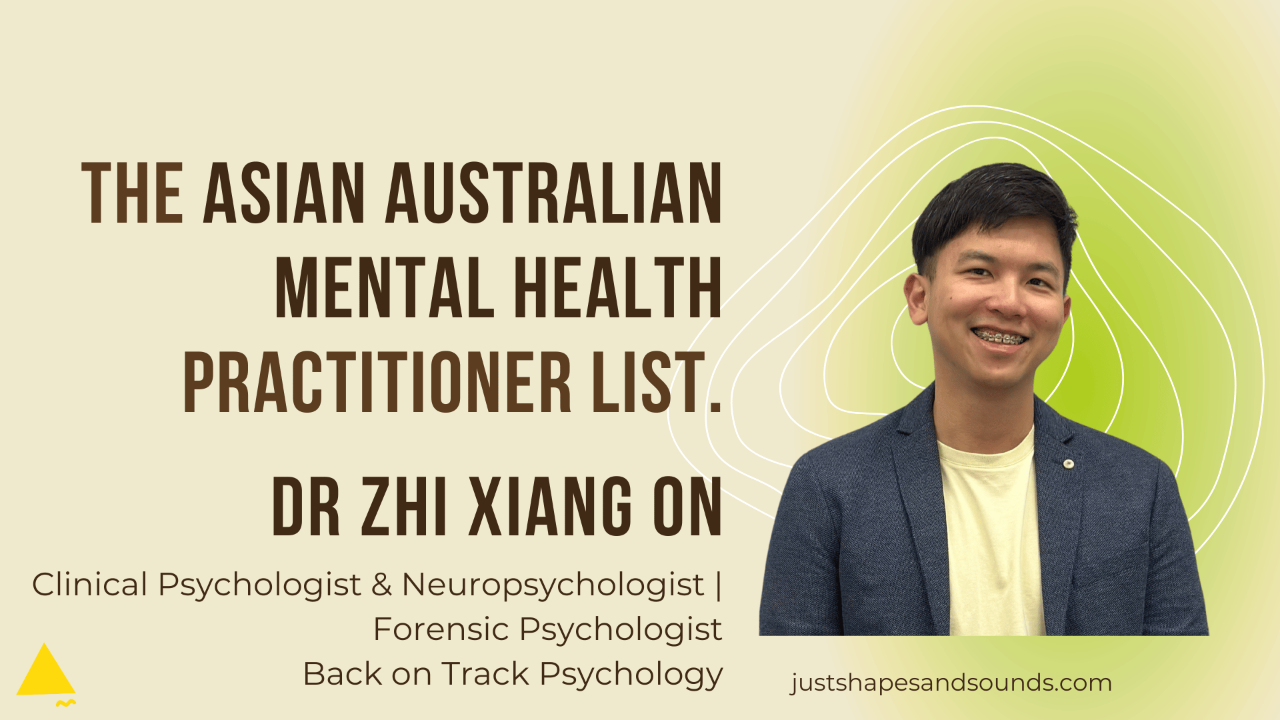Meet Asian Australian Clinical Psychologist, Neuropsychologist and Forensic Psychologist: Dr Zhi Xiang On
Oct 01, 2025
We know that it's not always easy trying to work out which therapist we might like to work with: Because the decision isn't just about where they're located and when they're available, but there's a bit more of a human, relational element to the decision too.
So here at Shapes and Sounds, we want to help make that process just a little easier.
Every month, we'll be introducing a therapist from the Asian Australian Mental Health Practitioner List to help you gain a bit more insight into who you feel might be a good fit for you or someone that you know.
This month we're excited to connect you with Dr Zhi Xiang On who is a Clinical Psychologist, Neuropsychologist and Forensic Psychologist offering services in Kew, VIC and Telehealth Australia-wide. We hope you enjoy connecting with On below!
~
1. What led you to choosing mental health as a career?
I was always curious about mental health—why people struggle, how our minds work, and what truly helps. Growing up, I saw people around me face challenges with their mental well-being, and even in my own experiences with anxiety, I often felt unsure about what to do or why it was happening. This deep curiosity, paired with a desire to make a meaningful difference, led me to pursue psychology. I wanted to bridge that gap between confusion and clarity, not just for myself but for others as well.
2. What is your unique cultural heritage?
I am Malaysian Chinese, and my cultural background gives me a deep appreciation for the intersection of identity, mental health, and the unique ways different communities experience and express psychological distress.
3. What are your areas of specialty and what kind of frameworks do you work from?
I specialise in clinical and forensic neuropsychological assessment, primarily focusing on diagnostic clarification for complex cases. My work involves identifying the root causes of cognitive, emotional, and behavioural difficulties and developing tailored, evidence-based treatment plans. I approach my work through a holistic and person-centred lens, integrating neuropsychological insights with relational and trauma-informed frameworks to truly understand and support each individual.
4. What kind of clients are you best able to support?
In terms of assessments, I work with individuals needing diagnostic clarification for neurodevelopmental conditions such as Autism and ADHD, as well as neurodegenerative conditions like dementia or cognitive impairments due to acquired brain injury (ABI)
For therapy, I support a diverse range of clients, but my passion lies in depth and relational work, particularly with individuals navigating family violence, trauma, and identity-related challenges. I am a LGBTQI-friendly practitioner. My approach is compassionate, reflective, and aimed at helping clients feel heard, understood, and empowered in their healing journey.
5. If you could be your own therapist right now, what do you think you would say to yourself?
I would remind myself to be kind and patient with myself. To listen to the different parts of me—the anxious part, the driven part, the tired part—with curiosity rather than judgment. I would encourage myself to slow down, acknowledge my own needs, and trust that growth happens even in the quiet, uncertain moments.
~
Connect with On via our Asian Australian Mental Health Practitioner List HERE.
Alternatively, if you feel like On may be a good fit for someone that you know, be sure to forward this page on to them too. Let us continue to not only support ourselves but all those around us too!
If you require urgent assistance, please do not contact On or any of the practitioners on this list. Instead, please call emergency services on 000 or call Lifeline on 13 11 14.
Shapes and Sounds does not recommend or endorse On or any of the practitioners listed on the Asian Australian Mental Health Practitioner List.
Please always consult your GP before making changes to your mental health care plan.
💡For community members:
We created the "Essential Guide for Asian Australian Mental Health" by surveying over 350 Asian Australians during Covid-19 lockdowns.
Download our guide and learn about the three most pertinent areas of concern for the Asian community, with tips and strategies to support you through.
🤝For mental health service providers:
Shapes and Sounds supports mental health organisations and teams to feel confident and resourced in providing culturally-responsive care to the Asian community in Australia.
Download our information pack to learn more.
